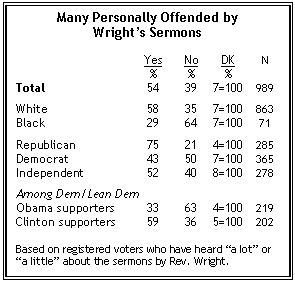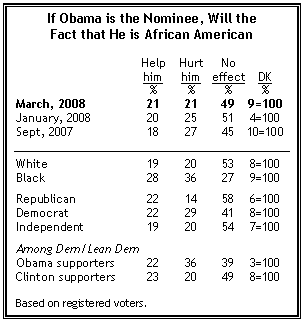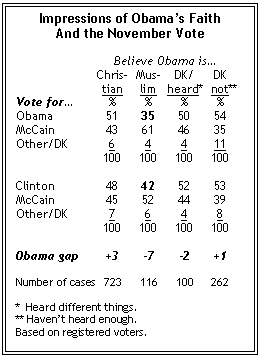
The recent controversy surrounding sermons by Obama’s former pastor, Rev. Wright, and Obama’s March 18 speech on race and politics have attracted more public attention than other recent campaign events, according to Pew’s weekly News Interest Index. Nearly eight-in-ten (79%) say they heard at least something about Wright’s sermons (51% a lot, 28% a little) and about half (49%) have seen video of the sermons. (See “Obama and Wright Controversy Dominate News Cycle,” March 27, 2008.)
Similarly, 54% say they heard a lot about Obama’s speech and 31% have heard a little. A majority of the public (51%) says they watched videos of his speech, including 10% who have watched it on the internet.
Not surprisingly, an overwhelming majority (70%) named Obama when asked which candidate they had heard the most about in the news over the last week.

More Democrats than Republicans (59% vs. 50%) reported hearing a lot about Obama’s speech and more report seeing video of his speech (55% vs. 47%). Slightly more Republicans than Democrats have seen videos of Wright’s sermons (55% vs. 47%).
There are sizable partisan differences in the reaction to Wright’s sermons: fully 75% of Republican voters who reported hearing at least a little about Wright’s sermons say they were offended by them, compared with 52% of independents and just 43% of Democrats. In addition, among Democratic and Democratic-leaning voters, far more Clinton supporters than Obama supporters say they were offended by Wright’s sermons, though even among the latter group, a third said they found the sermons offensive.
A clear majority of whites who heard about Rev. Wright’s sermons say they were personally offended by what he said, while most blacks who heard about his sermons say they were not offended.

On balance, judgments about Obama’s handling of the controversy were somewhat more positive than negative. Among voters aware of the issue, just over half say he has done an excellent (23%) or good (28%) job of handling the controversy, while 27% say he has done only a fair job and 15% a poor job. Two-thirds of Democrats say Obama did an excellent or good job, as do the vast majority of black voters. While Republicans are far more critical (61% say he did only a fair or a poor job), even among Republicans, a third say he did at least a good job of handling the issue.
Is Race a Factor?
There is no evidence that the controversy over Rev. Wright’s sermons has heightened the public’s impression that Obama’s race is a problem for him in terms of his electability. Roughly half of voters say that the fact that Obama is black will not be a factor to voters if he is the Democratic nominee, and among those who do think it is a factor, as many say it will help him with voters (21%) as say it will hurt him (21%).

If anything, voters are less likely to see Obama’s race as an electoral negative in the wake of recent events. In January, 25% said being African-American would hurt Obama’s chances, and in September of last year, 27% believed it would hurt, while just 18% thought it would help.
African Americans continue to be more concerned that Obama’s race is a problem – 36% believe this will hurt him with voters, though 28% think it will help. Only 27% of blacks think Obama’s race won’t be a factor. By comparison, most whites (53%) think the fact that Obama is African-American won’t make a difference to voters, and those who think it will are divided between thinking it will help him (19%) and hurt him (20%).
Democrats are more than twice as likely as Republicans to say Obama’s race will be a problem (29% vs. 14%). And among Democratic and Democratic leaning voters with a preference between Obama and Clinton in the primaries, it is Obama’s supporters who are far more likely to see Obama’s race as a potential problem (36% vs. 20%) than Clinton supporters. Some of this gap reflects the skepticism among blacks about how well an African-American candidate can do. But even when race is taken into account, white voters who back Obama are substantially more likely than white voters who back Clinton to say the fact that Obama is black will hurt him in the fall (32% vs. 18%).
Who Thinks Obama is Muslim?

A Pew Research Center News Interest Index survey earlier in March found that 79% of the general public had heard rumors that Obama is Muslim, and 38% had heard “a lot” about this. The current survey finds that most voters have no misconceptions about Obama’s religious beliefs – 53% say that he is Christian. But one in ten believes Barack Obama is Muslim. Roughly a third (34%) say they don’t know what his religious beliefs are, though 9% say the reason they don’t know is that they’ve heard different things about his religion, not that they haven’t heard about it.
Notably, the impression that Obama is Muslim crosses party lines: 14% of Republicans, 10% of Democrats and 8% of independents think he is Muslim. Within both parties, ideology is a major factor: 16% of conservative Republicans believe Obama is Muslim, compared with 9% of moderates and liberals. And 13% of conservative and moderate Democrats believe Obama is Muslim, compared with just 5% of liberal Democrats.
The impression that Obama is Muslim varies by education, region, and religious background. Voters who did not attend college are three times as likely to believe Obama is Muslim when compared with voters who have a college degree (15% vs. 5%). And voters in the Midwest and South are about twice as likely as those in the Northeast and West to hold this belief. Nearly one-fifth of voters (19%) in rural areas say Obama is Muslim, as do 16% of white evangelical Protestants.
But there is little difference by age, gender or race in terms of voters’ likelihood of thinking Obama is Muslim. Most notably, about as many black (10%) as white (11%) voters believe he is Muslim.

There is little evidence that the recent news about Obama’s affiliation with the United Church of Christ has dispelled the impression that he is Muslim. While voters who heard “a lot” about Reverend Wright’s controversial sermons are more likely than those who have not to correctly identify Obama as a Christian, they are not substantially less likely to still believe that he is Muslim. Nearly one-in-ten (9%) of those who heard a lot about Wright still believe that Obama is Muslim.

Overall, the impression that Obama is Muslim has at most a slight impact on his fortunes in November – mostly because so few voters hold this belief in the first place. Moreover, Obama is only slightly less competitive against John McCain than Clinton is among the minority who believe this about him. Among the 10% of voters who say he is Muslim, 35% would still choose Obama over McCain in a general election matchup, while 61% would vote for McCain. These same voters would also choose McCain over Clinton, but by a smaller 52% to 42% margin.




